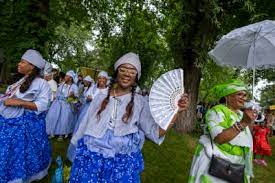At a ceremony to mark the anniversary of the abolition of slavery, Dutch King Willem-Alexander made a historic apology and begged for forgiveness. His speech was met with applause and whoops.
Following Dutch Prime Minister Mark Rutte’s apology for his nation’s involvement in the slave trade and slavery late last year, the king delivered his speech. It is a component of a broader reckoning with Western colonial histories that has recently been sparked by the Black Lives Matter movement.
Willem-Alexander referred to the apology in an emotional speech to an audience of invited guests and onlookers, saying, “Today I stand before you. I personally apologize today in my capacity as your King and a representative of the executive branch. My heart and spirit are burdened by the words, too.
The monarch claimed to have ordered an investigation into the precise part played by the Orange-Nassau royal family in the practice of slavery in the Netherlands.
“But today, on this day of remembrance, I ask forgiveness for the clear failure to act in the face of this crime against humanity,” he continued.
After finishing his statement and placing a wreath at the country’s national enslavement monument in an Amsterdam park, Willem-Alexander’s voice seemed to crack with grief.
In response to the king’s apology, former MP John Leerdam told Dutch TV NOS that he began to cry. We must acknowledge that this is a historic time, he remarked.
On July 1, 1863, slavery was outlawed in Suriname and the Dutch territories in the Caribbean; however, the majority of the enslaved laborers were made to work on plantations for an additional 10 years. The celebration and speech on Saturday are the first of a year’s worth of activities to celebrate the 150th anniversary of July 1, 1873.
According to research released last month, the king’s forefathers profited from shares that were practically handed to them as presents, earning the modern-day equivalent of 545 million euros ($595 million) from enslavement.
When Rutte apologized in December, he refrained from compensating those who were enslaved as children.
Instead, to address the legacy of slavery in the Netherlands and its former colonies and to enhance education about the subject, the government is establishing a 200 million euro ($217 million) fund.
Some Dutch people feel that is not enough. Before the king’s speech on Saturday, two organizations—Black Manifesto and The Black Archives—organized a protest march under the theme “No healing without reparations.”
There are many people who believe that an apology is insufficient, including my organization, The Black Archives, and the Black Manifesto. According to Mitchell Esajas, director of the Black Archives, an apology should be coupled with some sort of reparations or restorative justice.
In a celebration of the abolition of slavery in Suriname, marchers wore vibrant traditional clothing. According to the organizers, persons who were enslaved were not permitted to wear shoes or bright clothing.
On this day, we honor our ancestors, but we also feel free, can dress whichever we choose, and can demonstrate our freedom to the rest of the world. Regina Benescia-van Windt, 72, stated.
The assassination of Black man George Floyd in the American city of Minneapolis on May 25, 2020, and the Black Lives Matter movement have reignited and intensified criticism of the Netherlands’ frequently cruel colonial past.
The national museum of Art and History’s ground-breaking 2021 exhibition takes a harrowing look at slavery in Dutch colonies. A report from the same year called Dutch complicity in slavery a crime against humanity and connected it to what it called enduring institutional racism in the Netherlands.
In the late 1500s, the Dutch first got involved in the transatlantic slave trade, and by the mid-1600s, they were a significant player. According to Karwan Fatah-Black, an expert in Dutch colonial history and an assistant professor at Leiden University, the Dutch West India Company eventually rose to become the largest trans-Atlantic slave trader.
The Dutch government is not the only one to apologize for past wrongdoings.
Denmark, which colonized Ghana from the middle of the 17th century to the middle of the 19th century, apologized to Ghana in 2018. Belgian King Philippe has expressed his “deepest regrets” for the wrongdoing in the Congo. Pope John Paul II issued an apology for the church’s complicity in slavery in 1992. Americans have engaged in highly charged arguments over removing slaveholders’ sculptures from the South.
A document that showed an ancestor owning stock in a slave-trading corporation prompted King Charles III to publicly support an inquiry into the British monarchy’s connections to slavery for the first time in April, according to a spokesman for Buckingham Palace.
While expressing their regret over slavery, Charles and his eldest son, Prince William, have not mentioned the crown’s involvement in the slave trade.
Two years ago, at a ceremony to commemorate Barbados becoming a republic, Charles spoke of “the darkest days of our past and the appalling atrocity of slavery, which forever stains our history.” African slaves were employed by English immigrants to transform the island into a prosperous sugar colony.
Although he noted that not everyone in the Netherlands is in favor of apologies, Willem-Alexander urged harmony.
He declared, “There is no manual for the process of healing, reconciliation, and recovery.” “We are in unexplored territory together. So let’s encourage and support one another.

















